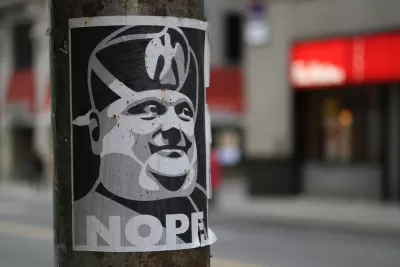After two years of making enemies in the city's planning, design, and transit communities, Toronto's Mayor Rob Ford has been given the boot for violating the city's conflict-of-interest law.

This morning, reports Henry Grabar, "a judge ruled that Ford violated the city's conflict-of-interest law with regards to a $3,150 donation lobbyists and corporations made to Ford's football foundation when he was a member of the City Council" and ordered him removed from office within 14 days. Many of Toronto's urbanists, alternative transportation advocates, and others those sick of seeing their city sullied by Ford's controversial policies and personal choices are no doubt celebrating the man who Toronto Star columnist Royson James says often "bulldozes ahead, ignoring the principles and explicit rules that govern his office," getting his just desserts.
So what does the future hold for the man whom Richard Florida called "the worst mayor in the modern history of cities"? Ford has announced that he will appeal the ruling. As David Rider and Daniel Dale note, "Ontario Superior Court Justice Charles Hackland’s decision appears to disqualify Ford from running in any byelection held before the regularly scheduled October 2014 mayoral election, but it does not say he can’t run in future elections."
As Grabar points out, though his critics may be celebrating today, Ford's removal may actually help him in the long run. "Michael Kolberg, writing at the Toronto Standard, cautioned back in August that ousting Ford for what seems like a technicality could actually bolster his re-election chances: 'the perception exists that the Mayor’s persecution is politically motivated. No matter how legitimate the conflict-of-interest charges may be, it feels like his opponents are trying to remove the mayor through a sneaky loophole.'"
FULL STORY: How Toronto Mayor Rob Ford Got Himself Removed From Office

Manufactured Crisis: Losing the Nation’s Largest Source of Unsubsidized Affordable Housing
Manufactured housing communities have long been an affordable housing option for millions of people living in the U.S., but that affordability is disappearing rapidly. How did we get here?

Americans May Be Stuck — But Why?
Americans are moving a lot less than they once did, and that is a problem. While Yoni Applebaum, in his highly-publicized article Stuck, gets the reasons badly wrong, it's still important to ask: why are we moving so much less than before?

Using Old Oil and Gas Wells for Green Energy Storage
Penn State researchers have found that repurposing abandoned oil and gas wells for geothermal-assisted compressed-air energy storage can boost efficiency, reduce environmental risks, and support clean energy and job transitions.

Greening Oakland’s School Grounds
With help from community partners like the Trust for Public Land, Oakland Unified School District is turning barren, asphalt-covered schoolyards into vibrant, green spaces that support outdoor learning, play, and student well-being.

California Governor Suspends CEQA Reviews for Utilities in Fire Areas
Utility restoration efforts in areas affected by the January wildfires in Los Angeles will be exempt from environmental regulations to speed up the rebuilding of essential infrastructure.

Native American Communities Prepare to Lead on Environmental Stewardship
In the face of federal threats to public lands and conservation efforts, indigenous groups continue to model nature-centered conservation efforts.
Urban Design for Planners 1: Software Tools
This six-course series explores essential urban design concepts using open source software and equips planners with the tools they need to participate fully in the urban design process.
Planning for Universal Design
Learn the tools for implementing Universal Design in planning regulations.
Heyer Gruel & Associates PA
City of Moreno Valley
Institute for Housing and Urban Development Studies (IHS)
City of Grandview
Harvard GSD Executive Education
Salt Lake City
NYU Wagner Graduate School of Public Service
City of Cambridge, Maryland



























